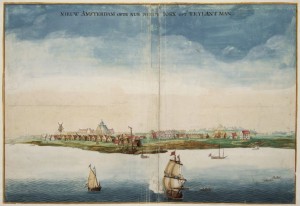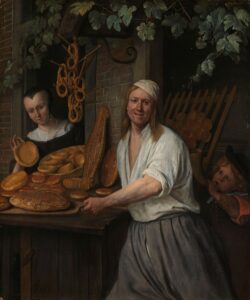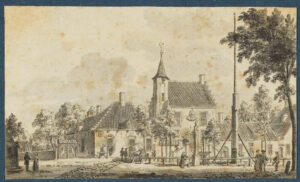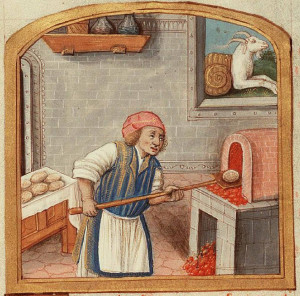Happy New Year everybody! Many records become public after 20, 25, 50, 75, or 100 years. Here is an overview of some of the records that became public as of 1 January 2024. Exceptions may exist for records that involve people that could still be alive. Just because records are public does not mean they are immediately available online. Some archives digitize the birth, marriage, and death records immediately, others do not. Some records will be online, some may be ordered via scanning on … [Read more...]
Dutch term – Nieuw
Nieuw is the Dutch word for "new." You may come across the term in place names in Dutch colonies. For example, New York City was once called Nieuw Amsterdam in the colony of Nieuw Nederland (New Netherland). … [Read more...]
Quick tip – What is the Higher Authority?
Try finding out what higher authorities may have created records about your ancestors. A few examples: If you are researching in a specific municipality, check the records of the province to see what records they received from that municipality. If you find a court case, find out what the appellate court was to see if there was an appeal. If your ancestor worked for a school, find out who appointed the teachers. Until recent times, this typically was either the church or the … [Read more...]
Dutch term – Duivekater
A duivekater was a traditional diamond-shaped bread eaten on religious holidays, mainly Christmas. It was often highly decorated. I have sometimes come across the term in deacons' accounts where poor children were given them as a gift. They can also be seen on various paintings from the 1600s. It is not a common word but a fun one to learn on Christmas day. … [Read more...]
Non-unique Place Names in the Netherlands
Most places in the Netherlands have unique names. But there are a few cases where places in different locations have the same name. Other towns have slightly different names today, but used the same names before spelling became standardized. This can cause problems, not just because researchers may search in the wrong place, but also because automated processes may link records to the wrong location. Places that occur in more than one location Alphen (North Brabant), Alphen (Gelderland), … [Read more...]
Dutch term – Onbekend, Niet Bekend
Onbekend means "unknown." Niet bekend means "not known." You may encounter these terms when informants are asked for information they do not possess. For example, in death records, you may see a reference that the names of the parents are not known to the informants. Informants for death registers were often neighbors, who may not have known the deceased's parents. Other records may mention "vader onbekend" [father unknown] if the child is born out of wedlock. For tips on researching those … [Read more...]
Quick tip – Newspapers as gateway to other records
Newspapers sometimes announced important events in our ancestors' lives. Knowing that an event took place can lead you to other records. Examples: A family announcement may lead you to birth, marriage, or death records. An announcement of a public auction of real or personal goods may alert you to possible notarial records. A call for creditors to come forward may alert you to a bankruptcy. A notice by a company that someone is no longer their agent may alert you to company … [Read more...]
Dutch term – Ab Intestato
Ab intestato means "without a will." The ab intestato heirs of a person are the people who would inherit by law if the person did not have a will. It is a Latin term you may find in Dutch documents regarding someone's estate, for example in a will or estate division. If a person writes a will, sometimes they may refer to the ab intestato heirs to indicate what (if anything) was left to them. It is just a shorthand for saying "to the people who would have inherited had I not made a will." If … [Read more...]
Dutch Genealogy News for December 2023
Here is an overview of all the new sources, websites, and other news of the past month. Sources The Red Cross Archives about Forced Laborers in World War II have been scanned and indexed. The records can be searched via the Nationaal Archief. Unfortunately, not all records survived so the index does not include all Dutch persons who were forced to work in Germany during the war. 6000 photos of the water board De Dommel can now be viewed at the website of the Brabants Historisch … [Read more...]
Dutch term – Xber or Xbris
In old records, you may find the word Xber or Xbris for the month. This means December or Decembris [Latin]. The names of the months were established when the start of the year was in March and December was the tenth month. Do not confuse Xber for October, the tenth month of our current calendar. … [Read more...]











